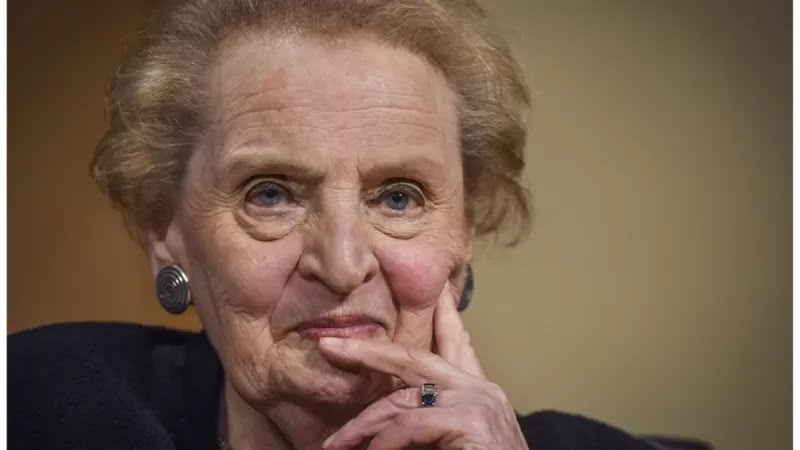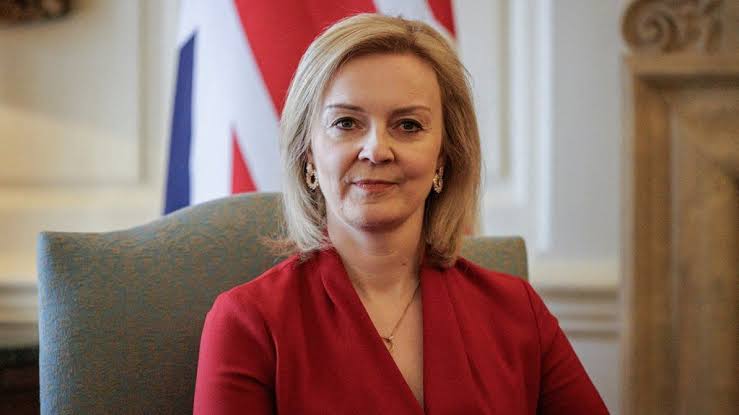International
Madeleine Albright, First Female US Secretary Of state Is Dead

-
The first woman to serve as U.S Secretary of State, Madeleine Albright is dead
- Albright was a central figure in President Bill Clinton’s administration, first serving as US ambassador to the United Nations before becoming the nation’s top diplomat in his second term
EDITOR’S PICK:
- Biden To Appoint Nigerian-American US Supreme Court Justice
- President Joe Biden Appoints Nigerian-American From MSU; Saweda Tasie As BIFAD Board Member
- Porn Star Is Ordered To Pay Trump $300,000, Loses Appeal In Defamation Case
EKO HOT BLOG reports that Madeleine Albright, the 64th U.S. secretary of state and the first woman to ever serve in the role, has died of cancer, her family said. She was 84.
Albright was a central figure in President Bill Clinton’s administration, first serving as US ambassador to the United Nations before becoming the nation’s top diplomat in his second term. She championed the expansion of NATO, pushed for the alliance to intervene in the Balkans to stop genocide and ethnic cleansing, sought to reduce the spread of nuclear weapons, and championed human rights and democracy across the globe.
Below is a statement from the family of @Madeleine: pic.twitter.com/C7Xt0EN5c9
— Madeleine Albright (@madeleine) March 23, 2022
News of her death broke while Ned Price, the State Department’s spokesman, was holding a daily briefing for reporters. “The impact that she has had on this building is felt every single day in just about every single corner,” he told reporters, adding, “she was a trailblazer.”
Albright rose in American politics before becoming the secretary of state under former President Bill Clinton in 1997. She received the Presidential Medal of Freedom in 2012.

PHOTO: Madeleine Albright is sworn-in by Vice President Al Gore (R) as the first woman to be Secretary of State, at the White House, Jan. 24, 1997.
Clinton and former Secretary of State Hillary Clinton released a statement Wednesday calling Albright “an extraordinary human being.”
“Few leaders have been so perfectly suited for the times in which they served,” the Clintons said. “As a child in war-torn Europe, Madeleine and her family were twice forced to flee their home. When the end of the Cold War ushered in a new era of global interdependence, she became America’s voice at the U.N., then took the helm at the State Department, where she was a passionate force for freedom, democracy, and human rights.”
Many other U.S. and world leaders issued statements on Wednesday in response to her death.
Albright was born Marie Jana Korbelova in Prague in 1937. Her parents were Jewish and fled the Nazi-occupied country just two years after her birth. They moved to Britain and converted to Catholicism. More than two dozen of Albright’s relatives, including three of her grandparents, were murdered in the Holocaust. Albright was unaware of her history — even that she had Jewish heritage — until it was uncovered by The Washington Post in 1997.
“I have always thought of myself as a Czechoslovak Catholic,” Albright said in an interview with The Washington Post at the time. “My parents were of the generation who thought they were the children of a free Czechoslovakia, the only democracy in central Europe. This was their pride [and] that is what I grew up with.”
Albright’s family returned to Czechoslovakia after the war and her father served as a Czech ambassador, but they were forced to flee again after the country fell in a Communist coup in 1949. They came to the U.S. as refugees.

President Barack Obama awards Madeleine Albright the Presidential Medal of Freedom in the East Room of the White House, on May 29, 2012, in Washington.
“Becoming a U.S. citizen is the most important thing that ever happened to me,” Albright said in an email to then-President Barack Obama ahead of the 2016 U.N. Refugee Summit. “My father said that when we were in Europe during WWII people would say, ‘We are sorry for your troubles and hope that you have everything you need; by the way, when will you be leaving to go back home?’ But in America, people said: ‘We are sorry for your troubles and hope that you have everything you need; by the way, when will you become a citizen?'”
Albright graduated from Wellesley College in 1959 – one of the most prestigious women’s colleges – and later founded the Albright Institute at her alma mater. She earned further degrees at School of Advanced International Studies at Johns Hopkins University and Columbia University.
While at Wellesley, she met Joseph Medill Albright, of the Medill newspaper family fame. The two married after a “whirlwind” romance and had three daughters: premature twins Alice and Anne, and a third daughter, Katherine. A second pregnancy between the twins and Katherine ended in the child dying, which Albright later said was likely the result of her contracting German measles while pregnant. Her marriage fell apart in 1982, but she wrote in her book, “at the time, I would have given up any thought of a career if it would have made Joe change his mind.”
Albright’s career began in the 1970s as an aide to U.S. Senator Edmund Muskie, who would later become secretary of state under President Jimmy Carter. She continued working in U.S. politics, becoming a staff member of the National Security Council in 1978 under Zbigniew Brzezinski, who had recruited her from Columbia.
Although she served as a foreign policy adviser to three Democratic presidential candidates (Walter Mondale in 1984, Michael Dukakis in 1988 and Clinton in 1992), she was not a household name when Clinton selected her to become ambassador to the United Nations.

FILE – U.S. Secretary of State Madeleine Albright shakes hands with U..S soldiers during her visit to Air Base Eagle near Tuzla, Aug, 30, 1998.
It was a crucial moment in history after the fall of the Soviet Union, and much of Albright’s work had been focused on Eastern Europe, including a fellowship she received based on her writings on the role of the press in political changes in Poland during the early 1980s.
While serving as U.N. ambassador, Albright experienced what she called the “deepest regret” of her career – the failure of the international community to stop the genocide in Rwanda. “This was such a massive killing in a very short period of time. Hundreds of thousands of people died very quickly,” she told PBS in 2004.
Albright and Clinton clashed with then-U.N. Secretary General Boutros Boutros-Ghali as she advocated fiercely for U.S. and democratic interests. Boutros-Ghali would later write in his memoir that the pair “betrayed” him when she cast a decisive veto against him serving another term as secretary-general in 1996.
Just weeks later, Clinton named Albright as secretary of state.
FURTHER READING:
- JUST IN: Black Box Of Crashed Boeing 737 Found
- Russia Reveals When It Will Employ The Use Of Nuclear Weapons
- Ukraine War: Kyiv Claims Moscow Forcefully Deported Thousands Of Ukrainian Children To Russia
“As secretary, I will do my best to talk about foreign policy not in abstract terms, but in human terms and bipartisan terms,” she said at the time. “I consider this vital because in our democracy, we cannot pursue policies abroad that are not understood and supported here at home.”
She was unanimously confirmed by the U.S. Senate.
Click to watch our video of the week:
Advertise or Publish a Story on EkoHot Blog:
Kindly contact us at [email protected]. Breaking stories should be sent to the above email and substantiated with pictorial evidence.
Citizen journalists will receive a token as data incentive.
Call or Whatsapp: 0803 561 7233, 0703 414 5611













